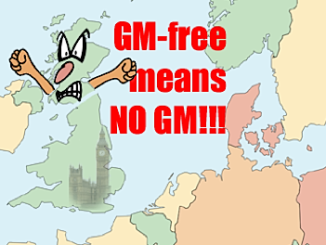9 Spanish NGOs representing farmers, food sovereignty and the environment (Red de Semillas, ASAC, COAG, SEAE, Ecologistas en Acción, Amigos de la Tierra, Plataforma Rural, Greenpeace and PALT), have called on the Spanish authorities to take measures against the existing GMOs cultivations in Spain before it is too late and the extent of contamination will require costly investments.

The organisations have released a common press release, based on two recently published scientific articles that demonstrate how European biodiversity is threatened by the uncontrolled spread of weeds resulting from genetically modified organisms (GMOs). The articles show that if GM oil seed rape is introduced into the environment in an uncontrolled way, contamination is a common phenomenon. This is the case not only in countries where GM oil seed rape is grown legally, such as in Canada and the US, but also in countries where the crop is strictly prohibited such as in Japan and Switzerland. Apparently in Switzerland feral herbicide-resistant oil seed rape weeds were detected around train stations. These studies counter arguments asserting that the risk of GM contamination is minimal (1).
According to the NGOs, there are several cases of GM plants that could pose a risk to the Spanish environment. Although GM oil seed rape is not authorized for cultivation in Europe, except for field tests, accidental spillage of transgenic rapeseed grains during transportation is especially dangerous because of the great ability of Brassica species to mate and give fertile offspring (1). In Spain, there are many species of the Brassica family and its close relatives so the risk of contamination is high.
Sugar beet is a GM crop for which field trials exist in Spain. In this case, there is also an increased risk of contamination because the pollen of this plant travels through the air and can cover big distances.
In the case of maize, there is also a high risk of contamination, as it is part of the local biodiversity and also cultivated in organic production systems. However Spain is the only European country that continues to allow the commercial planting of GM maize despite many cases of contamination observed in Catalonia and Aragon (2 & 3). In early October 2012 the Ministry of Agriculture (MAGRAMA) published data estimating that the Monsanto MON810 maize area has increased up to 116,306.00 hectares in 2012, an increase of 18,980.88 hectares from the previous year, but according to reports by the GE Free Platform of Andalusia (PALT) and Greenpeace the data provided are quite different to what published by the regional governments.
A particular concern is the case involving Agrostis stolonifera, a grass used in golf courses that has been out of control in the US due to its easy pollen dissemination and its high capacity to cross with wild relatives. In Spain the uncontrolled spread of this kind of GM plants could cause havoc as Agrostis stolonifera grows in most of Spain and its pollen could contaminate natural species of the Iberian Peninsula which besides being a Nature Reserve and a National Park, it is internationally recognized as a Biosphere Reserve.
Other crops that have been released for field trials in Spain and may contaminate local varieties or wild biodiversity are the tomato, alfalfa and poplars.
The NGOs conclude that despite the risks described above, to their knowledge, in Spain there have not been any results released regarding the monitoring of the gene flow of GMO crops, nor has mandatory monitoring plans for the approved varieties for commercial planting been required. For these reasons, and given the seriousness of this threat to biodiversity and to the crops themselves, the undersigned organisations request the Spanish government withdraw the GMO authorisations, both for commercial and field trials use, which may irreversibly contaminate our fields.
NOTES:
(1) Devos, Y.; Hails, R.S.; Messéan, A.; Perry, J.N. y Squire, G.R. (2012). Feral genetically modified herbicide tolerant oilseed rape from seed import spills: are concerns scientifically justified? Transgenic Res. 21: 1–21.
(2) Cipriano, J.; Carrasco, J.F. y Arbós, M. (2006). Contaminaciones: cada año más casos. En: La imposible coexistencia. Siete años de transgénicos contaminan el maíz ecológico y el convencional: una aproximación a partir de los casos de Cataluña y Aragón, 48-74. Ed. Assemblea Pagesa de Catalunya, Greenpeace y Plataforma Transgènic Fora!.
(3) Carrasco, J.F. (2008). La coexistencia sigue siendo imposible. Testimonios de la contaminación. Ed. Greenpeace.





